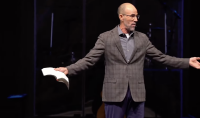JAN 18, 2026
Dr. Kevin Ueckert
Lead Pastor
Summary
Pastor Kevin preached from Joel chapter 3 about God's incredible repayment program. He explained how God steps into our worst moments with 'even now' grace, offering forgiveness and restoration when we turn to Him. The message emphasized that God doesn't just forgive our sins - He repays us with blessings beyond imagination. Through Christ's sacrifice, believers receive the Holy Spirit as a down payment on eternal life, with God paying the full price for our salvation. The pastor used the analogy of a home purchase where someone else pays not only the down payment but all monthly payments, then gives you an even better house at the end. This represents how God has paid in full for our salvation and promises 'even more' blessings as we walk with Him.
Intro Prayer
Father, we come before You with grateful hearts, knowing that You pursue us in our best moments and our worst. Thank You for Your incredible love and the gift of salvation through Jesus Christ. As we gather together today, we ask that You would open our hearts and minds to what You want to teach us. Help us to be receptive to Your Spirit's leading and to truly understand the depth of Your grace and mercy. Lord, prepare our hearts to receive whatever You have for us in this time together. We surrender our preconceived notions and ask that You would speak to us clearly. In Jesus' name we pray, Amen.
Ice Breaker
What's the best 'deal' or bargain you've ever gotten when making a purchase? What made it such a great deal?
Key Verses
- Joel 2:25
- Joel 2:28
- Joel 3:2
- Joel 3:14
- Joel 3:17
Questions
- How does the concept of God's 'repayment program' challenge or encourage you in your current circumstances?
- Pastor Kevin mentioned that God comes after us 'when we are at our worst.' Can you share a time when you experienced God's grace during a difficult season?
- What does it mean to 'tear our hearts' in repentance as mentioned in Joel chapter 2? How is this different from just feeling sorry?
- How does understanding that the Holy Spirit is like a 'down payment' change your perspective on your relationship with God?
- The sermon emphasized living in 'even more' rather than just 'even now.' What might be holding you back from experiencing God's abundant blessings?
- How does the story of Felix illustrate the importance of believers living in God's blessings so they can share with others?
- What does it look like practically to 'make room for God to do whatever He wants' in your daily life?
- How can we as a group encourage each other to live on mission and share the gospel with those around us?
Life Application
This week, identify one person in your sphere of influence (work, neighborhood, family, etc.) who needs to hear about God's love and grace. Pray for that person daily and look for an opportunity to share your story of how God has 'repaid' you with blessings despite your past mistakes. Be intentional about living in the 'even more' of God's blessings so that your life becomes a testimony of His goodness.
Key Takeaways
- God steps into our worst moments with 'even now' grace, offering restoration when we turn to Him in repentance
- God's repayment program is beyond comprehension - He repays our sin's devastation with His abundant blessings
- Through Christ, believers receive the Holy Spirit as a permanent down payment on eternal life, with God paying the full price
- We are called to live in the 'even more' of God's blessings so we can effectively share the gospel with others
- The Day of the Lord represents both final judgment for unbelievers and ultimate restoration for those who trust in Christ
Ending Prayer
Lord Jesus, thank You for the incredible truth that You have paid in full for our salvation and continue to repay us with blessing upon blessing. Help us to truly live in the 'even more' that You have provided rather than living as if we only have access to a small portion of Your goodness. Give us boldness to share Your love with those around us, just as You used the pastor to reach Felix. May our lives be such a testimony of Your grace that others are drawn to You. Help us to surrender completely to Your mission and to trust in Your perfect repayment program. We pray that You would use us to reach the ends of the earth with the gospel. In Your precious name we pray, Amen.

